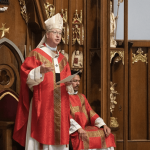VANCOUVER (CCN) — In the days following the death of Pope Emeritus Benedict XVI, Archbishop J. Michael Miller spoke about the life and legacy of Pope Benedict XVI and offered prayers for the Pontiff he worked with in Rome for three years.
During his homily for the First Vespers of the Solemnity of Mary Mother of God on Dec. 31, the Archbishop reflected on “the Church’s ancient hymn of thanksgiving, the Te Deum laudamus” (We praise you, O God, noting the song should be sung with particular fervour “as we mourn the passing of Pope Emeritus Benedict.”
“‘Lord, show us your love and mercy; for we put our trust in you.’ The majestic hymn of the Te Deum ends with this cry of faith, of total trust in God,” he said, “with this solemn proclamation of our hope. In this atmosphere of prayer and gratitude to the Lord for the gift of setting out on a new year, we especially celebrate Mary, the Virgin Mother of God. Let us ask Mary to intercede for us and to pray for her son Joseph/Benedict.”
The following day, at the Jan. 1 Mass for Mary, Mother of God and World Day of Peace, the Archbishop again spoke about Benedict. “As was befitting for such a modest man, he slipped away from us without fanfare, giving us only a few days warning of his impeding death. We give God thanks and praise for the gift that his servant Joseph Ratzinger was to the Church: first as a humble servant of the Gospel in the Lord’s Vineyard and as a theologian of towering significance, as a Bishop in Munich, as a close co-worker in the truth of St. John Paul II, then himself as Successor to the Apostle Peter entrusted with governing the universal Church before his resignation and living his last days in quiet and solitude. For these blessings of the faithful life and fruitful ministry of Benedict we express our deep gratitude to the Lord.”

Quoting the words of Pope Francis the night before, the Archbishop said: “We are moved as we recall him as such a noble person, so kind. And we feel such gratitude in our hearts: gratitude to God for having given him to the Church and to the world; gratitude to him for all the good he accomplished, and above all, for his witness of faith and prayer, especially in these last years of his recollected life. Only God knows the value and the power of his intercession, of the sacrifices he offered for the good of the Church.”
As secretary of the Congregation for Catholic Education from 2004 to 2007, Archbishop Miller worked with Cardinal Ratzinger, then Prefect of the Congregation for the Doctrine of the Faith, and was at the Vatican when the Cardinal was elected Pope in 2005.
In a newspaper interview shortly after Benedict was elected it was suggested to Archbishop Miller that the new Pope had put himself “strongly within the legacy of Pope John Paul II.” Archbishop Miller observed that that was “not surprising since he was the architect and the theological guide” to John Paul II.
“It is not just John Paul II’s legacy. In some ways, it’s his own, that he prepared. … He was very close in crafting that legacy.”
He went on to describe the new Pope as someone who “brings his own very strong sense of conviction, very strong sense of truth. He has a great respect for people and for freedom. He brings his intellectual formation.”
The Archbishop predicted that the world would see “different things emerge” under Benedict. “We know that he has always had a major interest in ecumenical matters, particularly with the Eastern churches; he has written on that for 30 to 40 years.”
As Cardinal Ratzinger he had a strong interest in preaching the Gospel, the inner life of the Church, and collegiality, the Archbishop said. “He also has some very sober judgments on society. … When he says that the Church is “taking on water,” that is a pretty strong statement that he is not blind to the real challenges that Catholics are meeting. At the homily last Monday, he talked about the “dictatorship of relativism.” He fears that there is an anchor being lost. I think those things will emerge in his pontificate.”
Archbishop Miller worked with Pope Benedict until June 2007, when he was named Coadjutor Archbishop of Vancouver.



